Armistice Day: Forgotten letters from WW1
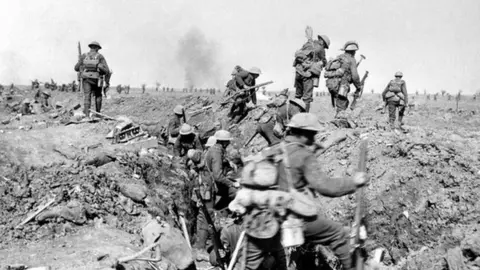 PA
PAOn the eleventh hour, of the eleventh day, of the eleventh month of 1918, fighting in World War One ceased.
The date would be forever marked as Armistice Day and this year marks the 100th anniversary.
Archived letters released by the Public Record Office of Northern Ireland (PRONI) are providing a unique insight into what life was like for those caught up in the events leading up to and following the armistice.
Correspondence from a prisoner of war camp and the account from the papers of an Ulster solider about the signing of the armistice are among the documents from the time.
War losses
The first census that followed the Great War was published in 1926. It estimated war losses for Northern Ireland at about 10,000 deaths.
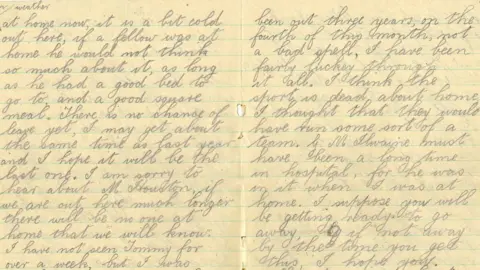 PRONI
PRONIIn October 1918, Carrickfergus-born Hugh McKeown was in a German prisoner of war camp.
Correspondence he sent from the camp to a friend back in Carrickfergus show his concern about the impact of war losses on his hometown.
His letter reads: "The old town has lost very heavy in this war. I had a letter from home and they were saying that they had bad weather at home now, it is a bit cold out here. If a fellow was at home he would not think so much about it as long as he had a good bed to go to, and a good square meal.
"There is no chance of leave yet. I may get about the same time as last year and I hope it will be the last one. I am sorry to hear about M Houston. If we are out here much longer there will be no one at home that we will know."
Suspension of hostilities
The Allies and Germany signed an armistice in a railway carriage in the Forest of Compiegne in France at 05:00 on 11 November 1918. Six hours later, the fighting on the front line ceased.
The armistice was drafted mainly by the French general Marshal Ferdinand Foch.
A German delegation was led by politician Matthias Erzberger and Major General Detlev von Winterfeldt
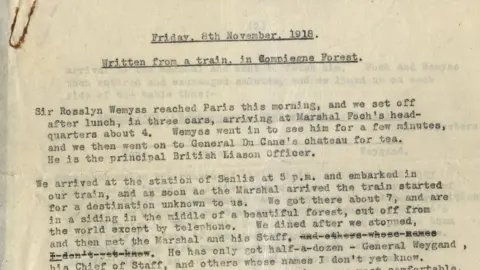 PRONI
PRONIA letter from the PRONI archives reveals a fascinating account found among the papers of an Ulster officer about the events that unfolded in the railway carriage when the armistice was signed.
Officials at PRONI did not have a complete list of the British delegation present at the meeting, but a document outlining what unfolded during the historic event was uncovered among the papers of Captain Francis Needham.
Captain Needham was a Royal Navy officer and Anglo-Irish peer also known as the Earl of Kilmorey.
The account states: "The terms were then read out to them and evidently made them squirm but they probably were prepared for most of them, as they must know the present military position and the state of mutiny that is in their fleet.
"When the reading of the terms was completed, Winterfeldt had the cheek to ask for a suspension of hostilities in order to save further loss of life. Of course Foch refused and they then asked for copies of the terms, for facilities to send a radio message to their Government."
Ending the war
Though the armistice of November 1918 halted the fighting it did not lead to immediate unconditional surrender by the German government.
Numerous small-scale, post-war military conflicts lingered on for more than a year after peace in Western Europe was concluded.
The armistice had to be prolonged three times, in December 1918 and in January and February 1919, before the Treaty of Versailles ratified it.
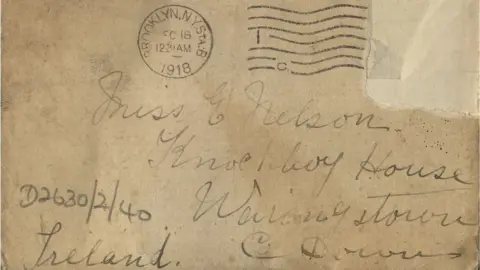 PRONI
PRONISue Pennington from Waringstown, County Down, had emigrated to New York by the time the armistice was signed.
In a letter to her aunt from December 1918 she provides an insight into the relief of the American civilian population after the armistice was signed.
She writes: "I suppose you were glad when the war was over. I know everyone in this country is, but it is terrible to see the poor boys coming home here without legs and arms, Nelson's boy has been in France since last March... it was awful that old Kaiser was the cause of it all he should be roasted alive for all he has done."
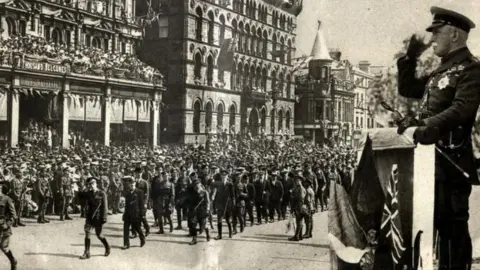 PRONI
PRONIOfficial peace celebrations around the United Kingdom were postponed until the new German Democratic National Assembly was established June 1919.
Peace was celebrated in Belfast in August 1919. A temporary cenotaph was set up outside the city hall.
An 11 mile long procession wound through the city, led by the officers and men of the 36th Ulster Division.
